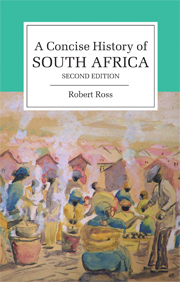Book contents
- Frontmatter
- Dedication
- Contents
- List of illustrations
- Preface
- Terminology and orthography
- Introduction
- 1 The settlement of the country
- 2 Colonial conquest
- 3 Unification
- 4 Consolidation
- 5 Apartheid
- 6 The costs of apartheid
- 7 ‘Let freedom reign’: the ending of apartheid and the transition to democracy, 1980–1994
- 8 Epilogue: the acid rain of freedom
- Suggestions for further reading
- Index
5 - Apartheid
Published online by Cambridge University Press: 18 December 2014
- Frontmatter
- Dedication
- Contents
- List of illustrations
- Preface
- Terminology and orthography
- Introduction
- 1 The settlement of the country
- 2 Colonial conquest
- 3 Unification
- 4 Consolidation
- 5 Apartheid
- 6 The costs of apartheid
- 7 ‘Let freedom reign’: the ending of apartheid and the transition to democracy, 1980–1994
- 8 Epilogue: the acid rain of freedom
- Suggestions for further reading
- Index
Summary
On 26 May 1948, white South Africa went to the polls. The result, rather to everyone's surprise, was a victory for the National Party under Dr D.F. Malan, in alliance with the Afrikaner Party of N.C. Havenga, which was essentially those who remained faithful to Hertzog's legacy. Between them they won seventy-nine seats in the new Parliament, as opposed to sixty-five for the United Party and six for the Labour Party. Considering that before the election the United Party had held eighty-nine seats and the National Party forty-eight, this represented a considerable turnaround. Smuts, who had himself been defeated in the constituency of Standerton, retired. He died, aged eighty, two years later. The National Party was to remain in power for a month under forty-six years.
To explain this result, two points have to be made. Firstly, the election was extremely close, and its outcome in part the product of the electoral system. Given the constituency system then in force, if only ninety-one people out of more than a million, strategically placed, had voted the other way, then the United Party would have won four more seats and hung the Parliament – and might even have been able to govern with the help of the three white representatives of the Africans. Indeed the National Party received only 41.5 per cent of the votes cast. In part, admittedly, this was because it did not contest all constituencies, but even had it done so it would probably not have increased its share of the vote by more than a couple of percentage points. The National Party benefited greatly from the ruling, written into the 1910 constitution, that rural seats need have fewer voters than the urban ones. Also, it won many seats by tiny majorities, while the United Party piled up superfluous votes in places where it was already sure of success.
- Type
- Chapter
- Information
- A Concise History of South Africa , pp. 122 - 153Publisher: Cambridge University PressPrint publication year: 2008



